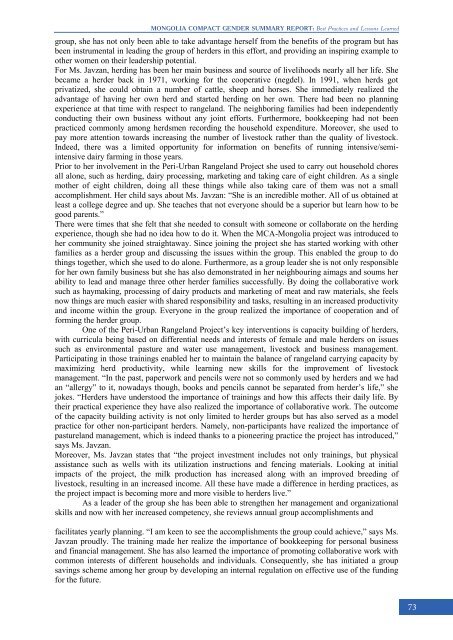Ulaanbaatar 2013
Ulaanbaatar 2013
Ulaanbaatar 2013
Create successful ePaper yourself
Turn your PDF publications into a flip-book with our unique Google optimized e-Paper software.
Mongolia Compact Gender Summary Report: Best Practices And Lessons Learnedgroup, she has not only been able to take advantage herself from the benefits of the program but hasbeen instrumental in leading the group of herders in this effort, and providing an inspiring example toother women on their leadership potential.For Ms. Javzan, herding has been her main business and source of livelihoods nearly all her life. Shebecame a herder back in 1971, working for the cooperative (negdel). In 1991, when herds gotprivatized, she could obtain a number of cattle, sheep and horses. She immediately realized theadvantage of having her own herd and started herding on her own. There had been no planningexperience at that time with respect to rangeland. The neighboring families had been independentlyconducting their own business without any joint efforts. Furthermore, bookkeeping had not beenpracticed commonly among herdsmen recording the household expenditure. Moreover, she used topay more attention towards increasing the number of livestock rather than the quality of livestock.Indeed, there was a limited opportunity for information on benefits of running intensive/semiintensivedairy farming in those years.Prior to her involvement in the Peri-Urban Rangeland Project she used to carry out household choresall alone, such as herding, dairy processing, marketing and taking care of eight children. As a singlemother of eight children, doing all these things while also taking care of them was not a smallaccomplishment. Her child says about Ms. Javzan: “She is an incredible mother. All of us obtained atleast a college degree and up. She teaches that not everyone should be a superior but learn how to begood parents.”There were times that she felt that she needed to consult with someone or collaborate on the herdingexperience, though she had no idea how to do it. When the MCA-Mongolia project was introduced toher community she joined straightaway. Since joining the project she has started working with otherfamilies as a herder group and discussing the issues within the group. This enabled the group to dothings together, which she used to do alone. Furthermore, as a group leader she is not only responsiblefor her own family business but she has also demonstrated in her neighbouring aimags and soums herability to lead and manage three other herder families successfully. By doing the collaborative worksuch as haymaking, processing of dairy products and marketing of meat and raw materials, she feelsnow things are much easier with shared responsibility and tasks, resulting in an increased productivityand income within the group. Everyone in the group realized the importance of cooperation and offorming the herder group.One of the Peri-Urban Rangeland Project‟s key interventions is capacity building of herders,with curricula being based on differential needs and interests of female and male herders on issuessuch as environmental pasture and water use management, livestock and business management.Participating in those trainings enabled her to maintain the balance of rangeland carrying capacity bymaximizing herd productivity, while learning new skills for the improvement of livestockmanagement. “In the past, paperwork and pencils were not so commonly used by herders and we hadan “allergy” to it, nowadays though, books and pencils cannot be separated from herder‟s life,” shejokes. “Herders have understood the importance of trainings and how this affects their daily life. Bytheir practical experience they have also realized the importance of collaborative work. The outcomeof the capacity building activity is not only limited to herder groups but has also served as a modelpractice for other non-participant herders. Namely, non-participants have realized the importance ofpastureland management, which is indeed thanks to a pioneering practice the project has introduced,”says Ms. Javzan.Moreover, Ms. Javzan states that “the project investment includes not only trainings, but physicalassistance such as wells with its utilization instructions and fencing materials. Looking at initialimpacts of the project, the milk production has increased along with an improved breeding oflivestock, resulting in an increased income. All these have made a difference in herding practices, asthe project impact is becoming more and more visible to herders live.”As a leader of the group she has been able to strengthen her management and organizationalskills and now with her increased competency, she reviews annual group accomplishments andfacilitates yearly planning. “I am keen to see the accomplishments the group could achieve,” says Ms.Javzan proudly. The training made her realize the importance of bookkeeping for personal businessand financial management. She has also learned the importance of promoting collaborative work withcommon interests of different households and individuals. Consequently, she has initiated a groupsavings scheme among her group by developing an internal regulation on effective use of the fundingfor the future.Page 73 of 8073


